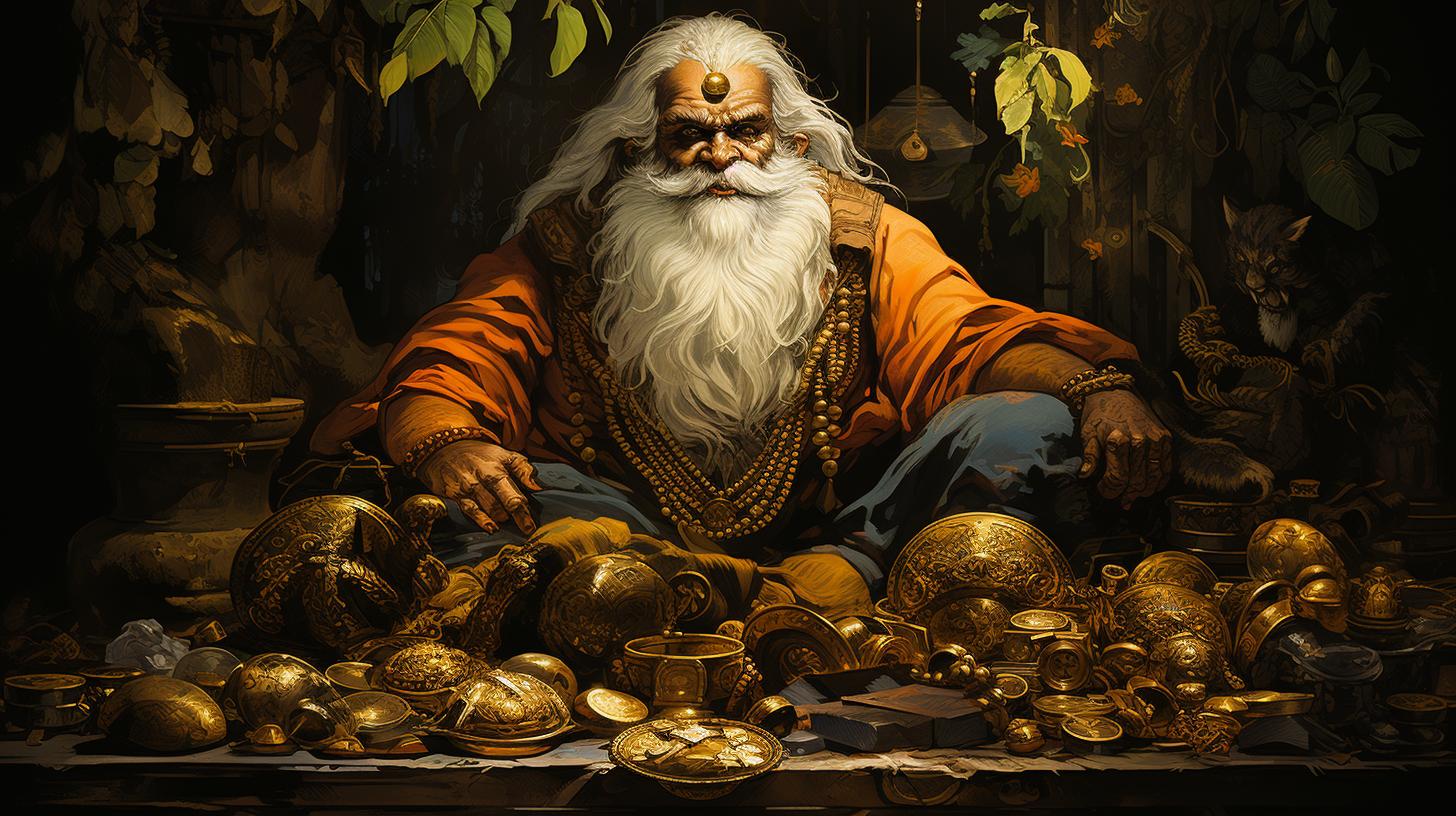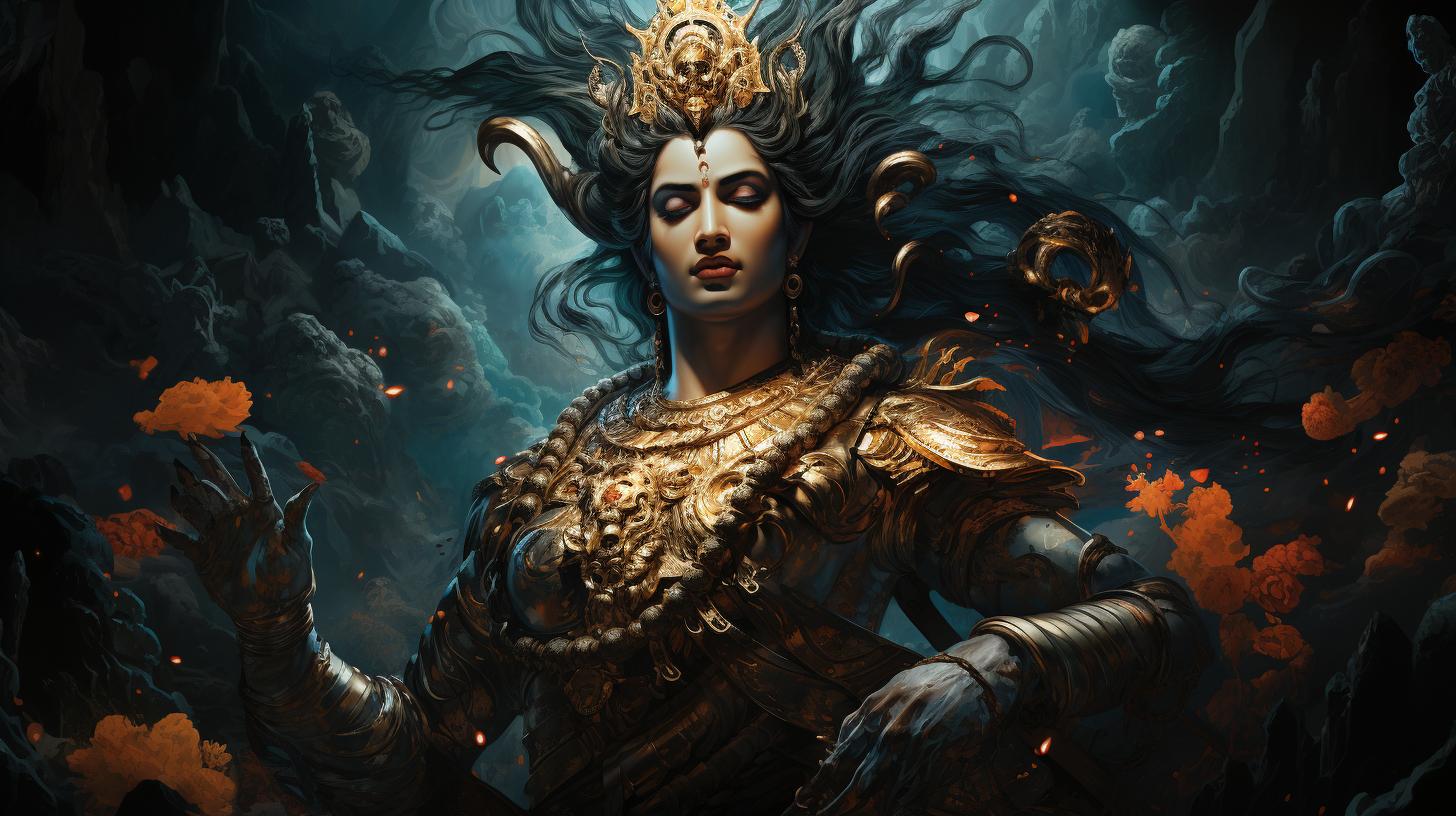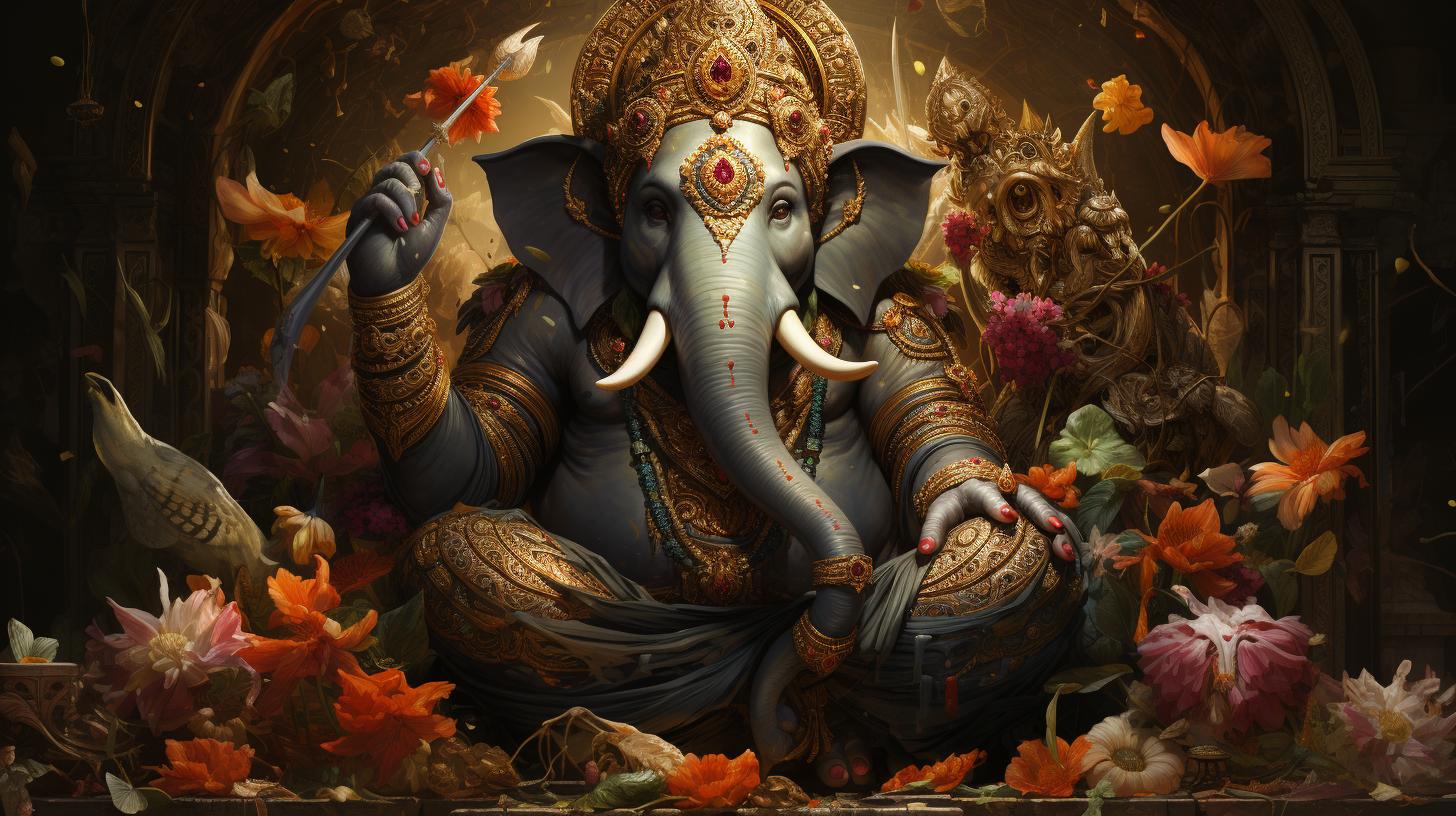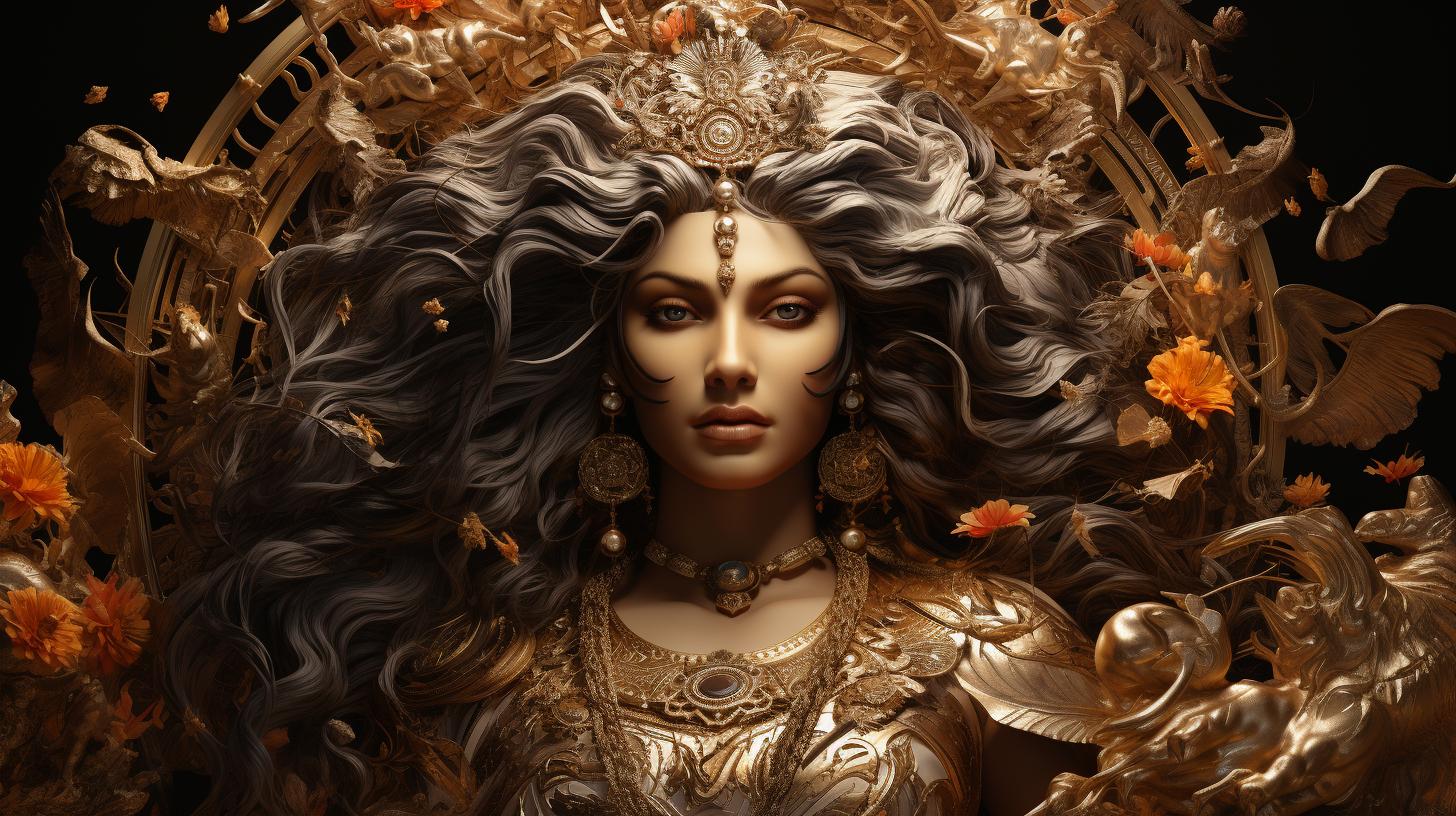‘Kubera: The Hindu God of Wealth and Prosperity’

Kubera, the Hindu god of wealth, is revered for his association with prosperity and abundance. With origins in Hindu mythology, Kubera’s role as the guardian of treasures and riches has made him a significant deity in Hindu culture.
Throughout art, literature, and festivals, Kubera’s presence is celebrated and honored, showcasing his importance in both spiritual and practical aspects of life. This article explores the legends, depictions, associations, and practices related to Kubera, shedding light on the enduring fascination with wealth and its impact on society.
The Origins and Legends of Kubera
Kubera, the revered Hindu god of wealth, holds a rich history and fascinating legends that surround his origins. According to Hindu mythology, Kubera was born as the son of Visravas, the sage and son of the demon Pulastya, and his wife Ilavida.
This lineage connected Kubera closely with the demons and gave him great influence over the material realm.
One of the most prominent legends associated with Kubera is his acquisition of wealth and his rise to power.
As the story goes, Kubera performed intense penance and received a boon from Lord Shiva, which granted him the position of the lord of wealth and the riches of the world.
This divine blessing bestowed upon Kubera the responsibility of managing and distributing fortune and prosperity among beings.
Another compelling tale in the lore of Kubera is his encounter with the demon king Ravana. Ravana, known for his insatiable greed, sought to obtain limitless power and wealth.
In his pursuit, he performed intense penance to please Lord Shiva. Pleased with his devotion, Lord Shiva granted Ravana a sacred lingam, the symbol of divine power. However, an arrogant Ravana disrespected the lingam, which enraged Lord Shiva. To punish him, Lord Shiva transferred the powers of the lingam to Kubera.
This event further solidified Kubera’s supremacy as the god of wealth and prosperity, while Ravana’s downfall was attributed to his excessive desire.
These legends and myths not only illustrate the origins of Kubera but also highlight the significance of wealth, karma, and moderation in Hindu culture.
Kubera’s journey from penance to power serves as a guiding principle for individuals seeking prosperity while reminding us of the consequences of unchecked greed and arrogance.
Kubera’s Role as the God of Wealth
Kubera, revered as the god of wealth in Hindu mythology, holds a prominent position in Hindu culture due to his association with abundance and prosperity.
He is regarded as the guardian of treasures and the bestower of riches, making him a significant deity in the Hindu pantheon.
In Hindu belief, Kubera is believed to govern all aspects of wealth and material possessions.
He is thought to control the distribution of wealth and ensure its proper use by individuals. As the god of wealth, Kubera is worshipped and revered by those seeking financial prosperity and material well-being.
Many devotees turn to Kubera for blessings and grace in matters of wealth, seeking his assistance in their business endeavors, financial stability, and overall prosperity. It is believed that sincere devotion and homage to Kubera can bring forth financial abundance and success.
Furthermore, Kubera’s role extends beyond material wealth. He is also associated with spiritual wealth and the pursuit of overall well-being and satisfaction in life. Kubera’s favorable presence is believed to bring harmony, happiness, and fulfillment to individuals, encompassing both material and spiritual prosperity.
Devotees often invoke Kubera through prayers, mantras, and rituals to seek his blessings and favor. They offer prayers and offerings to Kubera in the hope of attracting prosperity into their lives.
Kubera’s influence in the pursuit of wealth is not limited to ancient times but continues to resonate in modern society.
Kubera’s teachings emphasize the balance between material wealth and spiritual growth.
He encourages individuals to use their wealth wisely, for the betterment of society and the upliftment of others. Kubera’s teachings inspire individuals to cultivate generosity, compassion, and ethical practices in their pursuit of wealth, promoting financial responsibility and a holistic approach to prosperity.
Overall, Kubera’s role as the god of wealth encompasses much more than material richness. He symbolizes the importance of prosperity, both material and spiritual, in leading a fulfilling life. Devotees turn to Kubera with faith and devotion, seeking his blessings to navigate the realm of wealth and abundance.
Depictions of Kubera in Art and Culture
Depictions of Kubera in art and culture offer a fascinating insight into the significance and symbolism associated with the Hindu god of wealth. With various representations across different mediums, Kubera’s iconography and presence in temples and shrines hold immense cultural and spiritual value.
Iconography of Kubera
Kubera’s iconography often portrays him as an enigmatic figure, symbolizing wealth, prosperity, and fortune. Typically depicted as a stout and regal figure, Kubera is characterized by his rotund body, adorned with opulent jewelry and rich garments.
His distinctive features include a large belly, representing abundance and fertility, and a single eye, reminiscent of his keen insight into matters of wealth and resources.
In his hands, Kubera holds a variety of emblematic objects.
Most commonly, he is depicted clutching a money bag, overflowing with gold coins, symbolizing his role as the custodian of treasures and wealth. Sometimes, he is depicted holding a ripe pomegranate, signifying prosperity and abundance in Hindu mythology.
His association with the mongoose further emphasizes his connection to financial growth and material well-being.
Kubera in Hindu Temples and Shrines
Kubera’s presence is prominent in numerous Hindu temples and shrines dedicated to wealth and prosperity. These sacred spaces provide devotees with an opportunity to pay respects, seek blessings, and offer prayers to Kubera.
In these temples, Kubera is often depicted as a deity sitting on a divine throne or pedestal, radiating an aura of affluence. Devotees offer flowers, incense, and other offerings as a sign of reverence and gratitude.
The temples’ architecture and design often incorporate intricate carvings and sculptures of Kubera, further enhancing the spiritual atmosphere and reinforcing his association with wealth.
Visiting these temples and shrines serves as a spiritual pilgrimage for worshippers seeking divine intervention in their pursuit of prosperity and financial stability.
The presence of Kubera’s image and the collective prayers of the faithful create an ambiance of hope and faith in the potential for material abundance.
In summary:
- Kubera’s iconography highlights his association with wealth and prosperity
- Depictions show him as a regal figure with distinctive features
- He is often depicted holding a money bag or a pomegranate
- Kubera’s presence in temples and shrines allows devotees to seek his blessings
- These sacred spaces reinforce the significance of wealth and abundance in Hindu culture
Kubera in Hindu Literature and Scriptures
Kubera’s prominence in Hindu culture is further emphasized through his presence in various Hindu literature and scriptures.
These ancient texts provide invaluable insights into the character and attributes of Kubera, shedding light on his significance as the god of wealth.
One significant scripture that mentions Kubera is the Puranas.
These ancient Hindu texts describe Kubera as the treasurer of the gods and highlight his role in distributing wealth and treasures among the deities. The Linga Purana specifically mentions Kubera’s association with the northern direction, further solidifying his status as the guardian of wealth.
The Mahabharata, an epic Hindu poem, also features references to Kubera. In this grand narrative, Kubera is portrayed as a benefactor who grants boons and assistance to individuals in need. His role in enabling prosperity and abundance is emphasized, showcasing his importance in the Hindu mythology.
Furthermore, Kubera’s presence in the Vishnu Purana is notable. This scripture addresses Kubera’s lineage and his relationship with other divine beings. It highlights his association with the Yakshas, a class of supernatural beings known for their connection to wealth and riches.
Additionally, Hindu literature such as the Kubera Mantra and the Kubera Yantra provide devotees with specific prayers and symbolic diagrams aimed at invoking Kubera’s blessings for wealth and prosperity. These spiritual practices have been passed down through generations, showcasing the enduring belief in Kubera’s ability to bestow abundance.
In conclusion, the presence of Kubera in Hindu literature and scriptures offers a deep understanding of his role as the god of wealth. These ancient texts portray Kubera as a bestower of prosperity, showing his significance in Hindu mythology and the enduring faith in his ability to bring abundance into the lives of devotees.
Kubera’s Association with Other Deities in Hindu Pantheon
In Hindu mythology, Kubera, the god of wealth, is not confined to his own realm. He shares a symbiotic relationship with various other deities, enriching the spiritual fabric of the Hindu pantheon.
Let’s explore some of Kubera’s notable associations with other divine beings.
- Lord Ganesha: Kubera is often depicted alongside Lord Ganesha, the elephant-headed god of beginnings and obstacles. As the remover of obstacles, Lord Ganesha is believed to bless Kubera with wisdom and success in his endeavors.
Together, they represent the harmonious coexistence of wealth and wisdom.
- Goddess Lakshmi: Kubera’s association with Goddess Lakshmi, the goddess of prosperity and fortune, further highlights his role in the accumulation and distribution of wealth. As the consort of Lord Kubera, Goddess Lakshmi complements his power and ensures the well-being of those who invoke their blessings.
- Lord Shiva: Kubera’s connection with Lord Shiva, the supreme deity of destruction and transformation, signifies the cycle of wealth and its transformative nature. Lord Shiva, who possesses ultimate control over material and spiritual wealth, guides Kubera in maintaining a balanced and responsible approach towards wealth management.
- Lord Vishnu: Kubera’s relationship with Lord Vishnu, the preserver of the universe, showcases his integral role in sustaining economic stability and ensuring abundance in the world.
Lord Vishnu’s divine blessings support Kubera in his endeavors to bestow wealth and prosperity upon devotees.
These associations demonstrate the interconnectedness of divine forces within Hindu mythology and emphasize the intricate relationship between wealth, prosperity, and various deities. Kubera’s collaborations with these revered gods and goddesses highlight his pivotal role in the grand tapestry of Hindu divinity, where wealth is revered as a means to spiritual growth and holistic well-being.
Kubera Festivals and Celebrations
Kubera, the Hindu god of wealth, is honored and celebrated through various festivals and special occasions that revolve around the theme of prosperity. These festivals allow devotees to express their gratitude and seek blessings for financial success and abundance.
Two significant celebrations dedicated to Kubera are Dhanteras and Sharad Purnima, each offering unique rituals and traditions.
Dhanteras: Celebrating Kubera and Wealth
Dhanteras marks the beginning of the five-day Diwali festival and holds immense significance in Hindu households across the United States. Also known as Dhanatrayodashi, this auspicious day is dedicated to worshipping Kubera and seeking his blessings for prosperity.
Devotees engage in various traditions such as cleaning their homes, lighting oil lamps, and purchasing new items, particularly gold, silver, or utensils, symbolizing the acquisition of wealth.
One of the key rituals observed during Dhanteras is the lighting of Diyas (traditional lamps) to illuminate the household and invite positive energy. Additionally, devotees create intricate Rangoli designs at the entrance of their homes to welcome Kubera and Lakshmi, the goddess of wealth.
The day culminates with offering prayers and performing Aarti, a ceremonial worship involving the waving of lamps and singing devotional songs.
Sharad Purnima: Kubera’s Birthday Celebration
Sharad Purnima, also known as Kojagiri Purnima, is a celebration held during the full moon night in the autumn season, usually in October. This sacred occasion commemorates Kubera’s birthday and signifies the harvest festival in many parts of the United States.
Devotees observe fasting and engage in various rituals to seek blessings for wealth, well-being, and happiness.
During Sharad Purnima, devotees partake in the traditional practice of observing a vigil through the night, staying awake and engaging in spiritual activities. It is believed that on this night, Kubera symbolically dispenses wealth and fulfills the wishes of those who seek his blessings.
Many devotees also perform special Pujas (ritualistic worship) and recite Kubera mantras to enhance their connection with the deity and attract prosperity into their lives.
Overall, Dhanteras and Sharad Purnima hold great cultural significance for Hindus in the United States as they provide an opportunity to honor Kubera, express gratitude for wealth, and seek blessings for abundance and prosperity for themselves and their loved ones.
Kubera in Popular Beliefs and Practices
Beliefs and practices surrounding Kubera, the Hindu god of wealth, have been deeply rooted in the culture and traditions of Hinduism for centuries. Devotees seeking wealth and prosperity often turn to Kubera for blessings and guidance.
This section explores two main aspects of popular beliefs and practices associated with Kubera: Kubera Mantras and Prayers for Wealth, and Kubera Yantra: Harnessing Kubera’s Energy.
Kubera Mantras and Prayers for Wealth
Many followers of Kubera engage in reciting powerful mantras and prayers to attract wealth and abundance into their lives.
These sacred chants are believed to resonate with Kubera’s energy and invoke his blessings. Mantras such as “Om Yakshaya Kuberaya Vaishravanaaya Dhanadhanyadi Padayeh” and “Om Shreem Hreem Kleem Shreem Kleem Vitteshvaraya Namah” are commonly recited to invoke Kubera’s favor and financial prosperity.
Devotees often perform these recitations with deep devotion and faith, accompanied by offerings of flowers, incense, and fruits.
Kubera’s prayers for wealth also play a significant role in popular beliefs and practices.
Devotees seek his intercession by offering heartfelt prayers, expressing their desires for financial stability and abundance. They believe that by connecting with Kubera through prayer, they can receive his blessings and guidance in their pursuit of wealth.
These prayers are often performed during auspicious occasions, such as festivals and special observances dedicated to Kubera.
Kubera Yantra: Harnessing Kubera’s Energy
Another popular practice associated with Kubera is the use of Kubera Yantra, a sacred geometric symbol representing Kubera’s energy and divine presence. Yantras are visual tools used to focus the mind and invoke specific energies.
The Kubera Yantra, typically depicted as a square or rectangle with intricate patterns and symbols, is believed to attract wealth, abundance, and prosperity.
Devotees often place the Kubera Yantra in their homes, businesses, or wallets, considering it a powerful talisman for financial well-being.
They meditate or concentrate upon the Yantra’s visual representation, channeling their intentions towards attracting wealth and success. The Kubera Yantra serves as a constant reminder of Kubera’s presence and the importance of aligning one’s thoughts and actions with the pursuit of prosperity.
In conclusion, Kubera’s popular beliefs and practices encompass the recitation of powerful mantras and prayers for wealth, as well as the use of Kubera Yantra to harness his divine energy. These practices reflect the deep-rooted faith in Kubera’s ability to bless devotees with financial prosperity and abundance.
By engaging in these rituals and incorporating Kubera’s teachings into their lives, followers seek to align themselves with the energy of wealth and invite its blessings into their existence.
Kubera and the Pursuit of Wealth in Modern Society
As we navigate the complexities of modern society, the teachings of Kubera, the Hindu god of wealth, offer valuable insights into the pursuit of prosperity and spirituality.
Through his teachings, Kubera emphasizes the importance of finding a harmonious balance between material wealth and spiritual well-being.
Kubera’s Teachings on Prosperity and Spirituality
Kubera’s teachings provide guidance on how to approach wealth in a mindful and responsible manner. He emphasizes the significance of cultivating a positive relationship with money, understanding that true prosperity extends beyond mere accumulation of wealth.
- Finding fulfillment beyond material possessions
- Practicing gratitude and contentment
- Balancing material wealth with spiritual growth
- Cultivating generosity and giving back to society
- Developing a mindset of abundance and prosperity
Applying Kubera’s Principles in Financial Planning
Integrating Kubera’s principles into our financial planning can lead to a more holistic approach to wealth management.
By incorporating these principles, individuals can align their financial goals with their spiritual values and create a more fulfilling and purpose-driven path to prosperity.
Steps for Applying Kubera’s Principles in Financial Planning:
- Evaluating financial goals and aligning them with personal values
- Creating a budget that reflects mindful spending and saving
- Investing in socially responsible and ethical ventures
- Practicing mindful consumption and avoiding excessive materialism
- Developing a long-term financial strategy focused on sustainable growth
By incorporating these steps, individuals can cultivate a financial plan that not only leads to wealth accumulation but also promotes personal well-being, societal welfare, and spiritual growth.
.




















